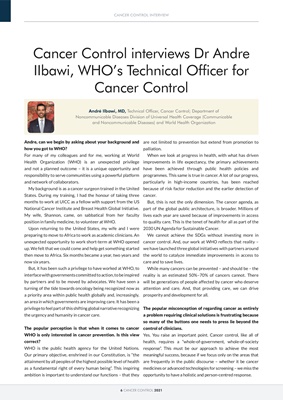
CANCER CONTROL INTERVIEW
6 CANCER CONTROL 2021
Cancer Control interviews Dr Andre
IIbawi, WHO's Technical Officer for
Cancer Control
Andre, can we begin by asking about your background and
how you got to WHO?
For many of my colleagues and for me, working at World
Health Organization (WHO) is an unexpected privilege
and not a planned outcome - it is a unique opportunity and
responsibility to serve communities using a powerful platform
and network of collaborators.
My background is as a cancer surgeon trained in the United
States. During my training, I had the honour of taking three
months to work at UICC as a fellow with support from the US
National Cancer Institute and Breast Health Global Initiative.
My wife, Shannon, came, on sabbatical from her faculty
position in family medicine, to volunteer at WHO.
Upon returning to the United States, my wife and I were
preparing to move to Africa to work as academic clinicians. An
unexpected opportunity to work short-term at WHO opened
up. We felt that we could come and help get something started
then move to Africa. Six months became a year, two years and
now six years.
But, it has been such a privilege to have worked at WHO, to
interface with governments committed to action, to be inspired
by partners and to be moved by advocates. We have seen a
turning of the tide towards oncology being recognized now as
a priority area within public health globally and, increasingly,
an area in which governments are improving care. It has been a
privilege to feel part of this shifting global narrative recognizing
the urgency and humanity in cancer care.
The popular perception is that when it comes to cancer
WHO is only interested in cancer prevention. Is this view
correct?
WHO is the public health agency for the United Nations.
Our primary objective, enshrined in our Constitution, is "the
attainment by all peoples of the highest possible level of health
as a fundamental right of every human being". This inspiring
ambition is important to understand our functions - that they are not limited to prevention but extend from promotion to
palliation.
When we look at progress in health, with what has driven
improvements in life expectancy, the primary achievements
have been achieved through public health policies and
programmes. This same is true in cancer. A lot of our progress,
particularly in high-income countries, has been reached
because of risk factor reduction and the earlier detection of
cancer.
But, this is not the only dimension. The cancer agenda, as
part of the global public architecture, is broader. Millions of
lives each year are saved because of improvements in access
to quality care. This is the tenet of health for all as part of the
2030 UN Agenda for Sustainable Cancer.
We cannot achieve the SDGs without investing more in
cancer control. And, our work at WHO reflects that reality -
we have launched three global initiatives with partners around
the world to catalyze immediate improvements in access to
care and to save lives.
While many cancers can be prevented - and should be - the
reality is an estimated 50%-70% of cancers cannot. There
will be generations of people affected by cancer who deserve
attention and care. And, that providing care, we can drive
prosperity and development for all.
The popular misconception of regarding cancer as entirely
a problem requiring clinical solutions is frustrating because
so many of the buttons one needs to press lie beyond the
control of clinicians.
Yes. You raise an important point. Cancer control, like all of
health, requires a "whole-of-government, whole-of-society
response". This must be our approach to achieve the most
meaningful success, because if we focus only on the areas that
are frequently in the public discourse - whether it be cancer
medicines or advanced technologies for screening - we miss the
opportunity to have a holistic and person-centred response.
André Ilbawi, MD, Technical Officer, Cancer Control; Department of
Noncommunicable Diseases Division of Universal Health Coverage (Communicable
and Noncommunicable Diseases) and World Health Organization